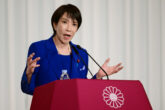April 08, 2015
Forget F-16s for Taiwan: It's All About A2/AD
The time has come for the United States to consider ending the sale of upgrades for F-16 fighter aircraft to Taiwan and instead shift military sales and cooperation to emphasize anti-access capabilities and concepts of operation.
U.S. policy toward Taiwan has always been a delicate dance. The United States supports a “one China” policy and it maintains a strategic relationship with Beijing, but Washington is legislatively required to support Taiwan’s “sufficient self-defense capabilities” thanks to the Taiwan Relations Act. A certain amount of diplomatic savvy is required to simultaneously pursue such seemingly contradictory policies.
Against this backdrop, decisions relating to F-16 sales have become a leading indicator of U.S. intentions vis-à-vis Beijing and Taipei. If the United States sells new F-16s to Taiwan, Beijing may perceive it as a threat to the Sino-U.S. strategic relationship and the PRC’s position in the region. If the United States refuses to arm Taiwan at all, it would not only be found in violation of the Taiwan Relations Act, but Taiwan would then be forced to make the grand strategic assumption that it no longer has U.S. support. The Obama administration has continued the delicate dance of its predecessors, offering an interim solution of not shipping F-16s to Taiwan but instead offering to help modernize Taiwan’s existing fleet.
Read the full article at The Diplomat.
More from CNAS
-
How China Could Use U.S. Farmland to Attack America
Chinese entities have been acquiring land in key locations near U.S. military bases, sparking national security concerns about possible spying — or even a potential attack. Fo...
By David Feith
-
Japan’s Iron Lady: A Prime Minister for the Trump Era?
This article was originally published in The Diplomat. A protégé of Abe Shinzo, newly elected Liberal Democratic Party President Takaichi Sanae inherits her mentor’s approach...
By Ryan Claffey
-
CNAS Insights | Mr. President, You Are Losing India
Last month, after Xi Jinping, Vladimir Putin, and Narendra Modi clasped hands in Tianjin, China, President Donald Trump concluded that the United States had “lost India and Ru...
By Lisa Curtis & Richard Fontaine
-
N. Korea Hardens Nuclear Stance at UN, Hints at Selective Diplomacy
Seven years after disappearing from the UN’s main stage, North Korea returned — and made sure the world listened. Vice Minister Kim Son-kyong stood before the General Assembly...
By Dr. Go Myong-Hyun




